
Once you have opened a Maxima session, load package draw and then set global variable draw_renderer to vtk:
load("draw") $
draw_renderer: 'vtk $
To read the documentation on object implicit, write the following sentence:
describe(implicit) $
Implicit surface colored with solid color:
draw3d( color = yellow, implicit(x^2+y^3+sin(z)=1,x,-1.2,1.2,y,-1.2,1.2,z,-1.2,1.5) ) $
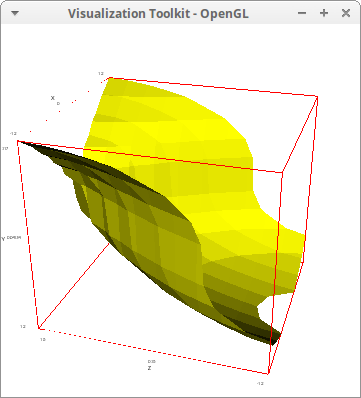
Implicit surface colored with the enhanced3d model and default palette:
draw3d( enhanced3d = true, implicit(x^2+y^2+sin(z)=1,x,-1.2,1.2,y,-1.2,1.2,z,-1.2,1.5) ) $
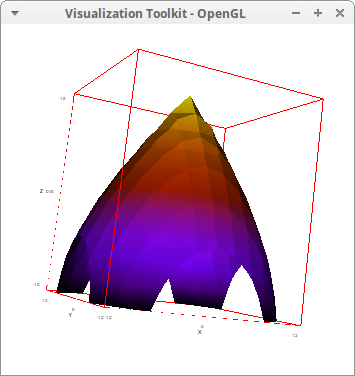
Implicit surface colored with the enhanced3d model, where both the scalar levels and the palette are defined by the user:
draw3d( enhanced3d = [sin(2*y), x, y, z], palette = [25,-23,-17], implicit(cos(x)+y^2+sin(z)=1,x,-1.2,1.2,y,-1.2,1.2,z,-1.2,1.5) ) $
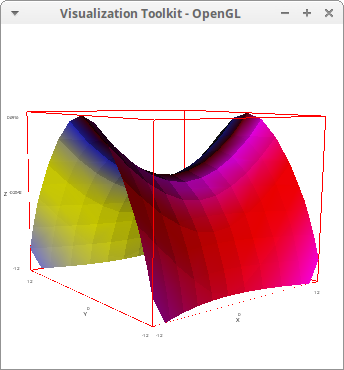
Transparent surface. We can control the resolution with options x_voxel, y_voxel and x_voxel:
draw3d(
x_voxel = 12,
y_voxel = 12,
z_voxel = 12,
opacity = 0.6,
palette = gray,
enhanced3d = [sin(x+y-z),x,y,z],
implicit((x^2+y^2+z^2-1)*(x^2+(y-1.5)^2+z^2-0.5)=0.015,
x,-1,1,y,-1.2,2.3,z,-1,1) ) $
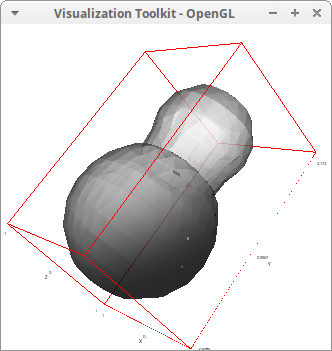
Local option wired_surface on an implicit object:
draw3d(
enhanced3d = true,
wired_surface = true,
palette = [15, -4, 20],
implicit((x^2+y^2+z^2-1)*(x^2+(y-1.5)^2+z^2-0.5)=0.015,
x,-1,1,y,-1.2,2.3,z,-1,1)) $
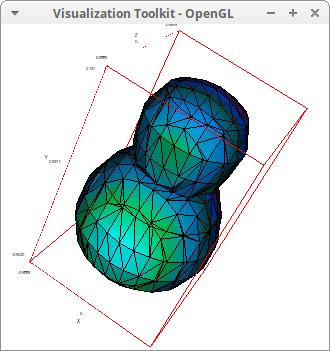
Two implicit surfaces. The second one is a transformation of the sphere:
draw3d( color = red, implicit(x^2+y^2+z^2=1,x,-1.2,1.2,y,-1.2,1.2,z,-1.2,1.2), transform = [2+1/3*x, 2+1/2*y, 2+3/2*z, x, y, z], palette = [5, -17, 6], enhanced3d = sin(x-y+z), implicit(x^2+y^2+z^2=1,x,-1.2,1.2,y,-1.2,1.2,z,-1.2,1.2)) $
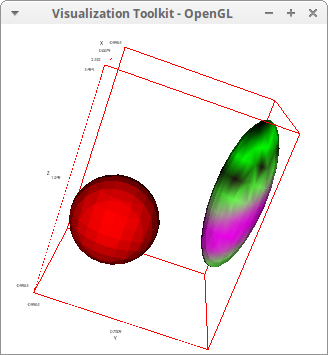
Another example:
draw3d(
enhanced3d = true,
x_voxel = 50,
y_voxel = 50,
z_voxel = 50,
implicit(2=(cos(x+%phi*y)+cos(x-%phi*y)+cos(y+%phi*z)+
cos(y-%phi*z)+cos(z-%phi*x)+cos(z+%phi*x) ),
x,-4.5,4.5,y,-4.5,4.5,z,-4.5,4.5))$
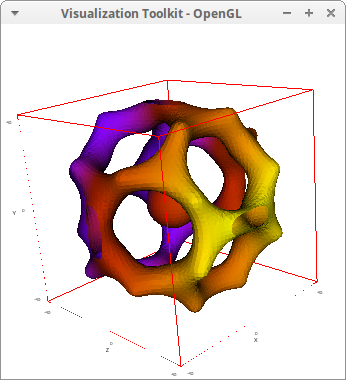
Viviani's curve, the intersection of the sphere of radius 2 centered at (0,0,0), and the cylinder of radius 1 centered at (1,0,0):
draw3d(
axis_3d = false,
/* Viviani's curve */
line_type = tube,
line_width = 0.1,
nticks = 50,
parametric(1+cos(t), sin(t), 2*sin(t/2), t, 0, 4*%pi),
/* cylinder centered at (1,0,0), r=1 */
color = red,
x_voxel = 30, y_voxel = 30 , z_voxel = 30,
implicit((x-1)^2+y^2=1, x, -0.1, 2.1, y, -1.1, 1.1, z, -2.1, 2.1),
/* sphere centered at (0,0,0), r=2 */
color = yellow,
opacity = 0.7,
implicit(x^2+y^2+z^2=4, x, -2.1, 2.1, y, -2.1, 2.1, z, -2.1, 2.1) )$
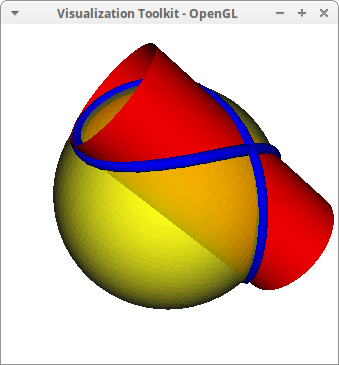
Isolines on an implicit surface. See also the effect of option opacity.
draw3d(
x_voxel = 20,
y_voxel = 20,
z_voxel = 20,
palette = gray,
opacity = 0.8,
enhanced3d = true,
isolines = [x^2-y^2+z^3,x,y,z],
line_width = 3,
implicit(max(x^2+y^2+z^2,2*x^2+2*y^2)=1,
x,-1.5,1.5,y,-1.5,1.5,z,-1.5,1.5) )$
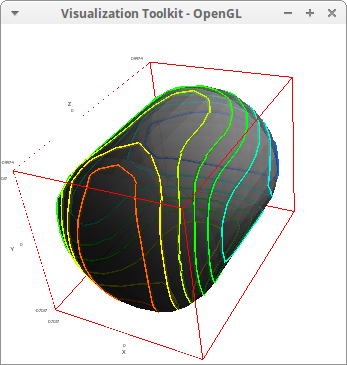
© 2011-2017, TecnoStats.